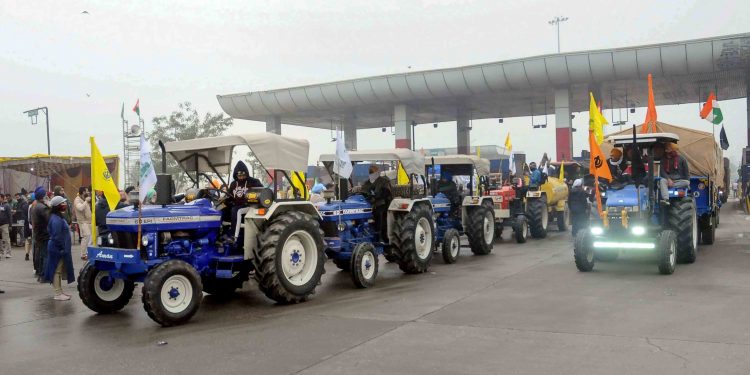The country celebrates the 72nd Republic Day in the midst of a global pandemic-induced gloom, a ravaged economy and protests by farmers on an unprecedented scale against a controversial legislative exercise. The star attraction of the celebrations throughout the country is the magnificent parades by regiments of the Indian Army Navy Air Force, police and paramilitary forces at Rajpath in the national capital. This year, a tractor ‘parade’ by lakhs of aggrieved farmers is to be witnessed soon after the grand parade is over. The venue will shift from Rajpath to the Outer Ring Road in Delhi and the forces on duty at the Republic Day parade would be remobilised to keep a vigil on the tractor march. The organisers have assured the police the march would be held peacefully.
It is a story unfolding like never before, that hundreds of thousands of farmers, both young and old and their womenfolk are showcasing to the nation and the world their plight – fighting for their bread and butter – in this fashion.
It would not have come to such a pass had the government at the Centre not been inflexible in its stand and even vindictive, while adopting the strategy of tiring out the farmers agitating at the Delhi borders for the past two full months against three contentious farm laws. Eleven rounds of discussions had taken place between the government and the farmers since the agitation beginning on 26 November 2020. But the talks remain inconclusive as both sides refuse to budge from their respective positions. Only lately did the government slightly climb down announcing the laws would be put on hold for about 18 months so that the farmers can discuss what amendments they want to the laws. This means the government will not concede the farmers’ demand for repealing the laws. The latter turned down the offer and iterated their demand. In fact, the last round of discussions made matters worse. The farmers charged agriculture minister Narendra Singh Tomar with ‘insulting them by keeping them waiting for hours only to tell them he had asked them to consider the government’s proposal and then said he has ended the process of meetings.
The government had earlier moved the apex court to do its work of finding a solution to the stalemate and also to restrain the farmers from going ahead with their tractor march. The court strayed into unchartered territory by taking it upon itself the task of mediating on the resolution of conflict over the controversial farm laws. But, it smartly nixed the move to involve it in the tractor march by dumping the responsibility on the Delhi police.
The Delhi Police had no option but to chalk out with the agitating farmers the routes for the tractor parade. Special Commissioner of Police (Intelligence) Dependra Pathak told the media an agreement had been reached with the Bharatiya Kisan Union that the march would be carried out after Republic Day celebrations at Rajpath and that there should be no disturbance during the parade.
Likewise, the Sanyukt Kisan Morcha (SKM) assured the administration that only tractors and trolleys with tableaux would be allowed in the march and no one would carry a weapon, “not even sticks.” A maximum of five people can ride on one tractor and no one will ride on the bonnet, bumper or roof of tractors.
The group made it clear that through the tractor parade the farmers seek to tell the country and the world about their plight and their aim is “not to conquer Delhi, but to win the hearts of the people of this county.”
The symbolism is not lost. The farmers have indeed their back to the wall. They fear the three laws would not solve the problem of lower returns from agriculture, as claimed by the government. On the contrary, they would be pushed to a situation where they would be left at the mercy of private operators buying agricultural produce from them on their terms without intervention from the government or legal protection as designed by the laws. The farmers have shown how much they can withstand to get their demand for the annulment of the laws. As mentioned earlier in this column, it is imperative in any democracy for the government to listen to the vox populi.






































